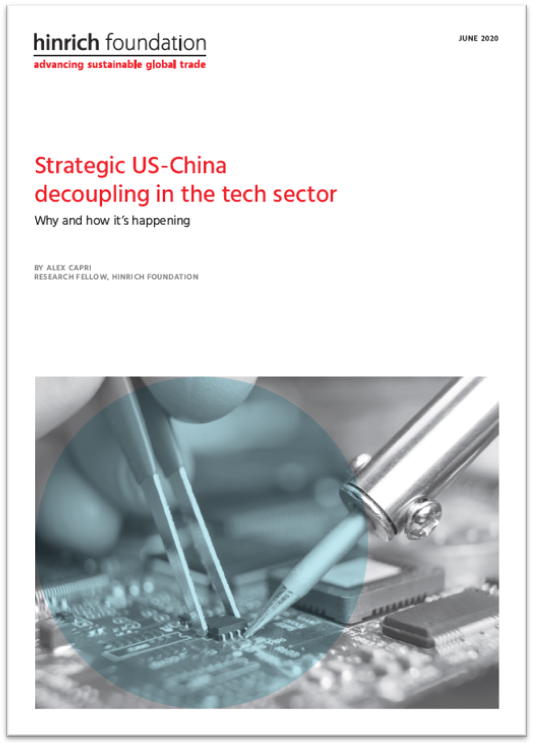Published 09 August 2020 | 10 minute read
The US-China geopolitical rivalry is tilting toward a full-blown clash of ideologies. Standards regarding data privacy, censorship and freedom of speech are now intertwined in everything from the sale of US semiconductors to the downloading of Chinese social media apps.
Article originally published in Forbes.
Two recent executive orders signed by US President Donald Trump provide a microcosm of this new techno-nationalist reality. Both orders effectively ban American companies from dealing with TikTok, the video streaming app, and, WeChat, the social messaging app. TikTok is owned by Beijing-based ByteDance — which is currently in talks with Microsoft, which might purchase some or all of TikTok —while WeChat is owned by Shenzhen-based Tencent.
The actions taken against both companies highlight widespread fears of data privacy breaches linked to the browsing, search and location functions inherent to digital platforms.
Barriers and backlash await Chinese companies
Chinese companies looking to expand internationally are now in an existential crisis. One problem facing TikTok and WeChat involves the same issue for all Chinese companies: Beijing’s National Intelligence Law and its Cybersecurity Law, which, essentially, require Chinese entities to turn over data, encryption codes and any other requested information to the Communist Party.
These laws reduce Chinese digital platform companies to de facto proxies of China Inc. Short of being fully taken over by a Microsoft or another US buyer, TikTok, for example, faces the impossible task of convincing Washington that they would not provide Beijing’s state apparatus with personal, proprietary and security-related data.
Another problem facing Chinese companies is their perceived linkage to Beijing’s official political narrative. Washington has named TikTok and WeChat, for example, as complicit in Beijing’s censorship of alleged human rights violations against the Uyghur and other Muslim populations in China’s far Western province of Xinjiang. Additional allegations have been made about TikTok’s complicity in the spread of fake news, and WeChat’s collection of data on the activities of overseas Chinese citizens.
Even without these allegations, Chinese digital companies are facing an intense backlash as they venture outside of the protected confines of China‘s digital landscape, which has been, and still remains closed to most foreign competitors.
Three techno-ideological trends
For the business sector, three trends must be understood and managed.
First, Washington will expand the weaponization of supply chains to include data flows and apps, in addition to enforcing restrictions on hard technologies. Second, the polarization and fragmentation of markets will become increasingly tethered to ideology. Third, the dynamics of the first two trends will produce a flurry of corporate reshuffling, restructuring, ring-fencing and strategic decoupling.
Data and digital platforms: the new strategic goods
Washington’s move to ban Chinese social apps and other digital platforms broadens the weaponization of “deep” technology supply chains, for example, by going beyond the blocking of semiconductors and other “strategic” dual-use technology to blacklisted Chinese companies. Data, and the digital platforms and apps associated with data, are now also fair game.
Washington’s recent success in crippling Huawei, the telecoms equipment manufacturer—by choking off U.S. technology access to its microchip suppliers such as TSMC — is testimony to what could be in store for Tencent. Tencent could find itself in a similar position to Huawei, if Washington restricted access to US server microchips, which are critical to its digital platforms.
A full ban on Tencent would also affect Apple, which hosts WeChat and its sister app, Weixin, on its iPhones. Tencent has a stake in a number of American companies such as Warner Music, Reddit, Lyft, Snap and a host of American gaming apps. All might have to decouple from Tencent.
Trump’s executive orders are both broad and vague, thus, extensive decoupling scenarios are possible. This uncertainty was reflected in Chinese tech stocks, which lost US$75 billion in value after the executive orders were released.
Fragmentation of markets along ideological lines
India provides a precursor of how techno-nationalism will fragment and polarize markets around ideological values. With a population of more than 1 billion people, India is the world’s largest democracy. Recently, the Indian government banned WeChat, TikTok and 57 other Chinese apps in retaliation to a deadly border clash on June 15, 2020, between Indian and Chinese troops.
Indian public opinion, however, had already become hostile to Chinese technology brands, primarily because of concerns over privacy, censorship and links to an autocratic state with values anathema to India’s political system. In fact, Trump’s executive orders cite India’s ban of TikTok as further justification for US action.
Digital platform companies such as Facebook have quickly capitalized on new market opportunities in India by emphasizing their democratic credentials.
China’s imposition of its national security law in Hong Kong provides another example of how conflicting ideologies spill over into not only the technology sector, but the commercial sector, in general.
The US responded to Beijing’s national security law in Hong Kong by passing a retaliatory law called the Hong Kong Autonomy Act, which enforces sanctions on individuals and entities within the government of China that “undermine the rights of the people of Hong Kong".
More importantly, the legislation targets any bank that would be seen as aiding and abetting violators. This makes any financial institution doing business with Chinese entities potentially a target of US sanctions.
Restructuring, re-shuffling and ring-fencing
If Microsoft does purchase TikTok from ByteDance, the challenge will be how it can ring-fence TikTok’s’ existing digital infrastructure and technology. There will be doubts about cybersecurity. And if the purchase includes TikTok’s China-based platform, Microsoft could face a backlash in the US for acquiescing to China’s censorship and cyber laws.
All of this marks the beginning of a period of accelerated corporate restructuring, re-shuffling and ring-fencing and, if no other safe alternative is available, decoupling.
© The Hinrich Foundation. See our website Terms and conditions for our copyright and reprint policy. All statements of fact and the views, conclusions and recommendations expressed in this publication are the sole responsibility of the author(s).








